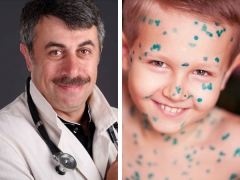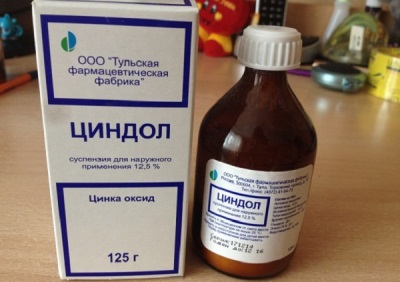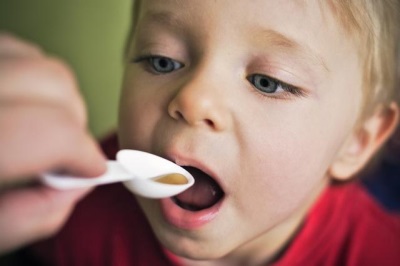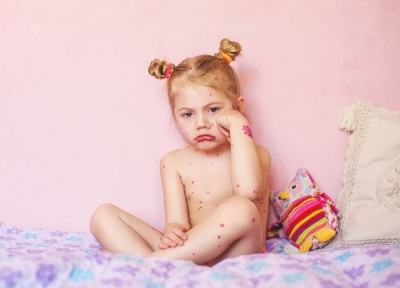Dr. Komarovsky: what is chickenpox and how to treat it
Chicken poxand is a very common infection, so almost all parents experience this disease in their child. Its causative agent is a virus belonging to the group of herpes viruses. It quickly spreads through the air, getting from a sick child to healthy babies, and the susceptibility to this infection is estimated at 90-100%. Let's find out what Komarovsky says about chicken pox and how it advises to treat it in childhood.
Who has chickenpox more often
A popular doctor confirms that chickenpox is most commonly detected in children under 12 years of age. Moreover, for most children up to the age of 12, the course of the disease is mild, but older children suffer from chickenpox harder, like adults.
Have babies up to 6 months, chicken pox is quite rare and difficult. A particularly difficult course of chickenpox is noted in newborns to whom the virus was transmitted by the mother during the last 5 days of gestation or the first days after birth. The majority of infants of the first six months of life are protected from the pathogen of chickenpox with antibodies from the mother, if she had been ill in childhood.

How is chickenpox in children
The main manifestation of chickenpox, which allows to distinguish this infection from others, Komarovsky calls a characteristic rash. Initially, it is represented by red spots, which after a few hours will transform into bubbles filled with transparent contents. The next day, the liquid in the bubbles becomes cloudy, and their surface shrinks, after which they become covered with crusts. After seven to eight days, dried crusts fall off and often leave no traces.
As Komarovsky notes, simultaneously with the appearance of the rash, the child’s general condition worsens and nonspecific symptoms of intoxication appear. The kid feels weak, complains of headaches, refuses food. In addition, he rises temperature body. Cough and runny nose with chickenpox are not observed.
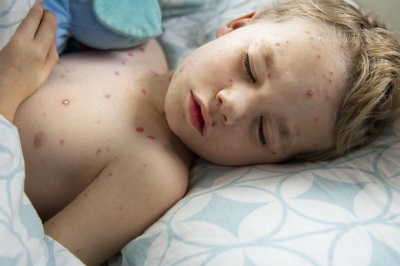
Treatment
How to treat chickenpox
Komarovsky notes that drugs that directly affect the pathogen of chickenpox are rarely used in the treatment of children. Such drugs that directly affect the herpes virus are shown only in severe cases of chickenpox, for example, in adolescents, children under one year old (for example, at 4 months or in a newborn) or in pregnant women. With a mild course, all treatment for varicella is symptomatic, that is, it is aimed at eliminating the symptoms that worsen the child’s condition.
When fevering a child with chickenpox, Komarovsky advises giving paracetamol or ibuprofen in the allowed dose. Famous pediatrician focuses parents on the fact that children with chickenpox are contraindicated aspirin, as this may lead to complications (liver damage).
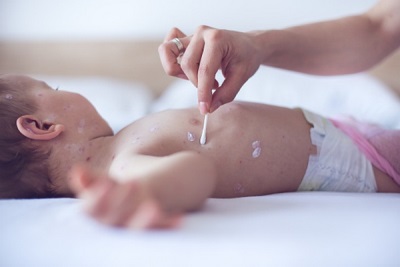
To appease the skin itch and to prevent the scratching of the bubbles, the result of which is infection of the rash and the formation of traces that will not disappear until the end of life, Komarovsky advises:
- Use prescribed by the doctor for skin treatment.
- If necessary, give the baby antihistamines inside.
- Distract the child.
- Carefully cut the nails of the child, and when it comes to babies, the well-known doctor calls the gloves a great way out.
- Perform a daily change of linen.
- Bathe baby in a cool bath, soaking the body after bathing. Bathing can be repeated every 3-4 hours, and a little soda can be added to the water.
- Avoid overheating the baby, as this increases the itching (the room should not be too hot).
To avoid complications, Komarovsky advises to pay enough attention to the drinking regime, since dehydration with chickenpox only contributes to kidney, liver and other internal organs of the baby.
Application green paint
A popular doctor notes that this drug has long been used in the treatment of chickenpox. And when chickenpox is mentioned, the majority of parents come to mind with a picture of a child in a green dot. However, according to Komarovsky, brilliant green does not cure such an infection at all, and all bubbles will be covered with crusts without using this dye.
However, there is some point in using brilliant green. If mom smears new bubbles every day, she will be able to see when the emergence of new elements of the rash has ceased. And already 5 days after this event, the child will cease to be infectious to others. At the same time, Komarovsky calls the decision to use Zelenka a personal matter of each mother and assures that the chicken pox will pass without the use of a green dye.
Is it possible to walk
Going with the child for a walk Komarovsky advises 5 days after the cessation of the appearance of new rashes, that is, during the period when the baby has already ceased to excrete the pathogen of chickenpox into the environment. But rush to visit kindergarten A well-known doctor does not advise, because chickenpox quite strongly inhibits children's immunity. Komarovsky advises to go to kindergarten only 2-3 weeks after recovery.
Prevention
The best protection against chickenpox Komarovsky calls inoculation. A popular doctor regrets that such a vaccine is not included in the list of mandatory vaccinations. This, like the opinion of parents about chickenpox, as a very mild illness, becomes an obstacle to frequent vaccination of children from chicken pox.
Dr. Komarovsky considers the actions of parents who have decided to be vaccinated against this infection, true, because for some kids, chickenpox can be deadly, for example, if a child has a chronic infection or immunodeficiency. In addition, vaccination will protect the child and at an older age, when, as you know, the course of the disease is often accompanied by complications.
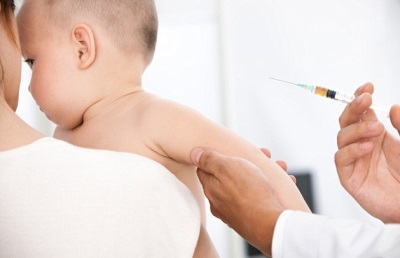
When asked whether he should infect a child with chickenpox, Komarovsky answers ambiguously. On the one hand, a well-known doctor does not blame such actions of parents, but on the other hand, he is confident that it is better to organize a “acquaintance” with chickenpox virus with a vaccine containing a weakened pathogen. Intentionally infecting a child with a virus that is not weakened is more dangerous, because, along with a mild course, there are cases when babies tolerate chicken pox very hard.
You will learn more about chicken pox by watching Dr. Komarovsky’s program.
